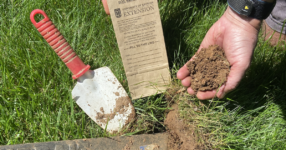How do you get healthy gardens and yards? It all starts with healthy soil! How do we know if we have healthy soil? Just bring some soil to The University of Georgia (UGA) Extension office. They will have your soil tested to provide a report on the nutrients and pH of your soil and a detailed recommendation to improve the soil as needed. This report is an essential guide to maintaining healthy soil for whatever we want to grow.

Rock Reed
Our yards and gardens need an annual or semiannual soil checkup. Our bodies deserve an annual checkup to make sure our organs are functioning as they should. Our swimming pools deserve a weekly checkup to make sure the chemical levels are balanced, and microbiological organisms are in check. In the same way, our yards and gardens deserve the benefit of a soil check for optimal maintenance. Our plants will gather nutrients from the soil and produce color, fruits, strength, and structure that cannot be obtained from weak or deficient soil.
What is healthy soil? First, healthy soil delivers structural support for the roots to grow and sustain the plant. Second, soil provides water and nutrients for your plants. The soil holds water and acts like a purification system as water passes through it. Healthy soil helps break down organic waste and recycles nutrients back to the environment. The soil also provides a habitat for beneficial microbes and animals. Finally, the soil is good for our ecology as it stores and releases beneficial gases like oxygen and nitrogen.

Most of us rarely consider how each mineral in our soil makes a difference in how healthy our plants are! Different plants use and need specific nutrients and soil acidity (pH). As an example, here are some common plants and their pH requirements.
What do you get with a soil test from UGA Extension? You will get a professional analysis of your soil, which will indicate the pH (a measurement of acidity and alkalinity) and the measurement of key elements in your soil. Macronutrients are those that are required in larger amounts such as: Nitrogen(N), phosphorous (P), potassium (K), calcium (Ca), magnesium (Mg), zinc (Zn) and manganese (Mn). Grass (sod) and garden areas should be sampled separately. You will get a professional recommendation of what your soil needs and how to achieve it.
How do you collect soil samples? Note: You only need about 1 pint (2 cups) of soil for each area!
- For each turf area (example: tall fescue or bermudagrass) you will collect 8 to 12 samples of soil. The samples should be taken from random locations in the yard using a zig-zag pattern. Collect a small “slice” of dirt from ground level to a depth of 4 inches. Put all the soil from the area being tested into a plastic (not metal) bucket, pulverize the soil, and mix thoroughly, and lay your sample on newspaper or a trash bag to air dry thoroughly. After your soil is dry, put this sample into a plastic zip lock bag.
- For each ornamental area (trees, roses, blueberries, etc.) gather several samples from inside the drip line (leaf/branch edge). Again, you will pulverize and mix the soil in a plastic bucket, let it air dry, and place it in a plastic zip lock bag. Note: Mark each bag clearly as you want an individual report for each desired location.
- Use this website for a more detailed explanation of “how to” soil collection instructions: https://extension.uga.edu/publications/detail.html?number=C896&title=soil-testing-for-home-lawns-gardens-and-wildlife-food-plots
How do you submit a soil sample to UGA Extension? It’s easy! You can bring collected soil from important areas of your yard and garden to your local UGA Extension office. If you collected soil from multiple locations, please remember to have each sample clearly identified with the different locations in a zip lock bag.
Bring your samples to your Fulton County Extension office (address and contact information below), and you will get a report back in 10-14 days at a cost of $12 per soil sample for a Routine Test. The analysis is a bit technical—it will give a detailed breakdown of current pH (soil acidity), minerals, and nutrients. However, the recommendations are easy to follow and implement. In laymen’s terms, they give specific nutrients to add and suggested amounts.
The test is easy, and the results will help bring you gardening success. Take out the speculation and become a garden guru without guessing what your garden needs.






